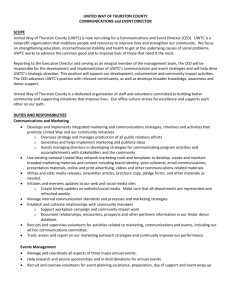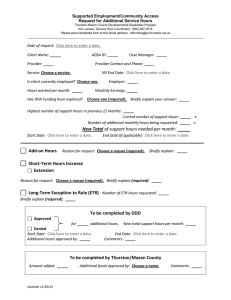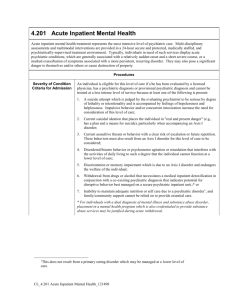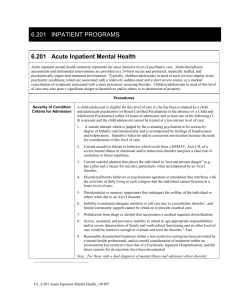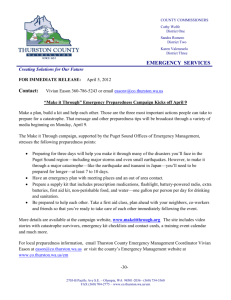BHR Evaluation and Treatment Center BHR`s Acute and Emergency
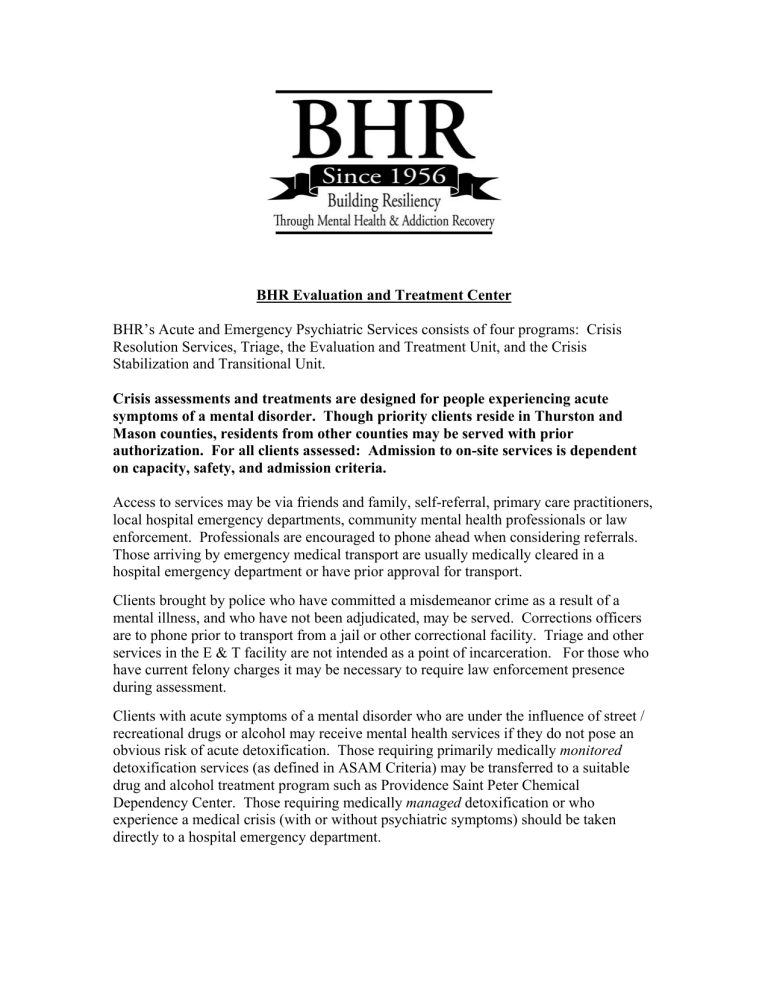
BHR Evaluation and Treatment Center
BHR’s Acute and Emergency Psychiatric Services consists of four programs: Crisis
Resolution Services, Triage, the Evaluation and Treatment Unit, and the Crisis
Stabilization and Transitional Unit.
Crisis assessments and treatments are designed for people experiencing acute symptoms of a mental disorder. Though priority clients reside in Thurston and
Mason counties, residents from other counties may be served with prior authorization. For all clients assessed: Admission to on-site services is dependent on capacity, safety, and admission criteria.
Access to services may be via friends and family, self-referral, primary care practitioners, local hospital emergency departments, community mental health professionals or law enforcement. Professionals are encouraged to phone ahead when considering referrals.
Those arriving by emergency medical transport are usually medically cleared in a hospital emergency department or have prior approval for transport.
Clients brought by police who have committed a misdemeanor crime as a result of a mental illness, and who have not been adjudicated, may be served. Corrections officers are to phone prior to transport from a jail or other correctional facility. Triage and other services in the E & T facility are not intended as a point of incarceration. For those who have current felony charges it may be necessary to require law enforcement presence during assessment.
Clients with acute symptoms of a mental disorder who are under the influence of street / recreational drugs or alcohol may receive mental health services if they do not pose an obvious risk of acute detoxification. Those requiring primarily medically monitored detoxification services (as defined in ASAM Criteria) may be transferred to a suitable drug and alcohol treatment program such as Providence Saint Peter Chemical
Dependency Center. Those requiring medically managed detoxification or who experience a medical crisis (with or without psychiatric symptoms) should be taken directly to a hospital emergency department.
E & T CLINICAL SERVICES
Triage / Intake –Triage staff provide an initial mental health assessment and crisis intervention. For those experiencing a mental health emergency, i.e., demonstrating symptoms of a mental disorder with such severity that they present a danger to themselves, danger to others, significant danger to property or an inability to care for basic needs of health and safety, assessment is made by a mental health professional.
This is followed by a nursing health screen by a registered nurse. Disposition may be to a service on-site or elsewhere in the community.
If ETU or CSU entry criteria are not met and it is determined that the client would benefit from off-site outpatient services, an appointment may be arranged by triage staff.
Clients assessed as needing more immediate medical evaluation are transferred to a hospital via ambulance.
Hours of operation are twenty-four hours a day, seven days a week.
Crisis Resolution Services – includes crisis evaluation and intervention at any location in Thurston or Mason Counties. Potential clients are people who demonstrate acute symptoms of mental illness. Clients who demonstrate enough insight, self-care ability, and/or community support to safely remain in or return to their residence receive this service in their homes or in the community. Immediate transport to the appropriate facility is arranged if the client requires containment for safety or inpatient care.
The CRS staff may develop crisis-specialty teams as necessary when responding to a client call for service. Each encounter is assessed for need of DD, child or elder mental health specialists, law enforcement, medical professionals, translation and cultural experts or others who may assist in resolution or stabilization of the situation. CRS personnel maintain current awareness of the availability of services, including inpatient beds. The team also provides linkage and follow up services with community providers to assure continuity of care. Persons of all ages and legal status are served.
Individuals demonstrating acute psychiatric need and who are unresponsive to crisis intervention, decline voluntary services, and appear to present a significant risk to self or others as a result of acute symptoms of mental disorder, may be evaluated for possible involuntary treatment by a DMHP as defined by RCW 71.05.020 (3) and (16). This may occur anywhere in Thurston / Mason counties, including the facility.
Crisis Resolution Services are provided by Crisis Interventionists and Designated Mental
Health Professionals.
Hours of operation are twenty-four hours a day, seven days a week.
Crisis Stabilization and Transitional Unit – The CSTU provides voluntary short-term observation, evaluation and brief psychiatric treatment for adults in crisis AND voluntary transitional care for adults who require a structured therapeutic environment. The primary focus is crisis and symptom stabilization in a calm, safe environment. Clients in crisis are allowed to rest, sleep, eat, and recover with a minimum of auditory and visual stimulation. Staff assist clients in examining factors contributing to the current crisis, in creating a symptom management plan for the future, and in determining aftercare. A variety of group and individual activities are scheduled for both crisis and transitional clients. Medication monitoring is provided for those in need. However, clients who require comprehensive medication evaluation with initiation of psychotropic medication should be served in a setting with a higher level of medical staffing (e.g., the ETU).
Professional staff include mental health professionals and mental health aides. The
Triage RN is available for consultation.
Licensure is by Washington Department of Health, Residential Treatment Facility, service category “Adult Residential Treatment”. WAC 246-337.
Capacity is ten beds. Hours of operation are twenty-four hours a day, seven days a week.
Length of stay is variable, from a few hours or days to several weeks.
All clients referred to the CSTU are authorized by Thurston Mason RSN.
Potential clients for the CSTU are prioritized based on:
•
Clinical need
•
Ability to benefit from services
•
Program capacity
•
Potential effects of admission on current client population
•
County of residence
•
Medicaid eligibility / enrollment in services
Inpatient Evaluation and Treatment : The Evaluation and Treatment Unit (ETU) is designed to serve adults, voluntary and involuntary, with acute symptoms of a mental disorder. Clients with serious mental health needs receive planned, comprehensive and individualized service from healthcare professionals experienced in emergency and acute psychiatric care. The program includes short-term inpatient psychiatric treatment, in a secure environment, and Superior Court ITA hearings pursuant to RCW 71.05 and RCW
71.34.
Medical activities include physical exam by a licensed practitioner, medication evaluation, medication administration, non-complex nursing procedures and sub-acute medical treatments.
Clinical staff include psychiatric nurses, mental health professionals, social workers, mental health aides and psychiatrists or ARNPs.
Pharmacy services and most laboratory functions are outsourced, though storage and preparation areas exist in the facility for medications and lab specimens. Meals and laundry services are also purchased, storage and preparation areas located on-site.
Though priority clients reside in Thurston and Mason counties, residents from other counties may be served upon agreement between Regional Support Networks. All clients admitted to the ETU are authorized by Thurston Mason RSN.
All clients are admitted through referral from a hospital or Triage. Admission priority is based on:
•
County of residence
•
Clinical need
•
ITA status
•
Ability to benefit from services
•
Bed availability
•
Potential effects of admission on both the client and the current inpatient population
Programming includes continuous evaluation for a less restrictive treatment option, therapeutic milieu, group and individual therapies, psycho-education, physical examination, chemical dependency evaluation as indicated, sub-acute medical treatments, psychotropic medications, secure environment, crisis planning and planning for appropriate aftercare.
Professional staff include Psychiatric Registered Nurses, Licensed Practical Nurses, mental health professionals (including specialists), mental health aides, social workers, and medical staff (psychiatrists, ARNP).
Capacity is fifteen beds. Hours of operation are twenty-four hours a day, seven days a week.
Maximum length of inpatient stay is variable, and may be up to thirty days, voluntary and involuntary periods combined. Exceptions are approved by TMRSN.
Superior Court Evaluation and Testimony : Within the E & T facility Thurston
County Superior Court is provided with a hearing room, Judge office, confidential consulting areas and equipment needed to perform duties. Clinical staff prepare and file legal documents pertaining to the involuntary detention of clients as required by RCW
71.05 and the Thurston County Court system. Clinical staff provide expert witness testimony at hearings pertaining to the involuntary detention of clients at the facility.
Hearings are conducted by Thurston County ITA Court Commissioner two days a week.
